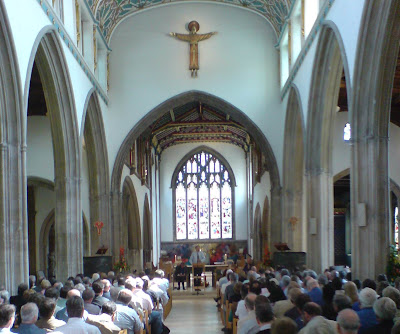
My course was a little disappointing and I left early (primarily because it was my day off). However I’ve got some further thoughts about the theology of being a training incumbent, which I’ll share when I have more time. I ended up giving a talk on Peak Oil in the middle of the course as well, which was a little odd…
Monthly Archives: May 2008
TBTM20080516
Bread of Life (3): two more roots
Two further roots to the meal are worth mentioning: temple ritual and the order of Melchizedek.
Once the people of Israel had got established in the Promised Land and the Ark of the Covenant was in Solomon’s temple various processes of worship were developed, through the temple. One central ritual was the ritual of atonement, when the sins of the community are wiped clean. The people gather for the ritual and there is a process by which the high priest slaughters a bull as atonement for his sacrifice so he becomes ritually pure, he goes into the Holy of Holies, he puts on the robe of God, the mantle of God (and he is then called ‘Son of God’) and he comes out and there are two goats, one is the scapegoat, one is the Lord, and he slaughters the lamb representing God and he sprinkles the blood in order to cleanse creation: it is the blood of the lamb that cleanses creation. Then he lays his hands on the scapegoat and it gets driven out and so that the sins are put away and creation is renewed. You can see how the Christian liturgy draws on this language and imagery: we are washed clean by the blood of the lamb. It is a renewing of the community and the whole creation.
One other precursor worth mentioning is referred to in Psalm 110, and in Hebrews in particular, that Jesus is our high priest for ever, after the order of Melchizedek. When I first came across this it was rather mysterious, but Genesis 14 is the source. Abraham has been involved in a battle and he gives a tribute to the local king (it could mean that he was the king of what became Jerusalem, because it is that sort of area). But Melchizedek offers a sacrifice and brings bread and wine and this is the blessing, he is acting, he is described as acting, as a priest, and this is a blessing for Abraham. So one of the keys things about this is that this is a priesthood (he is described in Genesis as a priest of the Most High God) that comes before the Levitical priesthood. As Jesus wasn’t a member of the Levitical priesthood, how can he have been a high priest? The answer is that he is a High Priest of the order of Melchizedek, which pre-dates the Levitical priesthood and is more powerful, there are all sorts of references to it being an eternal priesthood and so on, but I don’t want to go into this in too much detail as I will get out of my depth very quickly! It does seem to have been an important factor coming into what was understood.
So what does Jesus say about this meal? He says: “This is the new covenant.” He is deliberately establishing something, and it is drawing on the existing language, this old covenant, this Old Testament. (The word translated as testament is simply covenant, ie an agreement, in fact there were several agreements between God and the people of Israel.) Cultural forms like Passover and the temple ways of renewing the agreement, that covenant between God and the people – what Jesus is doing is saying this is the new agreement, God is acting again, God is renewing this process, there is a new agreement, you don’t have the old agreement any more, the old legal contract, there is a new one and this is what it is: it is the sharing of the bread and the wine.
Music and Lyrics
One movie
Ben Myers is starting up another meme, this one on movies, and he’s invited contributions:
1. One movie that made you laugh
Bachelor Party
2. One movie that made you cry
The Pursuit of Happyness
3. One movie you loved when you were a child
Star Wars
4. One movie you’ve seen more than once
Blade Runner
5. One movie you loved, but were embarrassed to admit it
Daredevil (Director’s Cut)
6. One movie you hated
Grindhouse
7. One movie that scared you
An American Werewolf in London, when I first watched it
8. One movie that bored you
Cloverfield
9. One movie that made you happy
Iron Man
10. One movie that made you miserable
Grindhouse
11. One movie you weren’t brave enough to see
The Descent
12. One movie character you’ve fallen in love with
Anna Scott in Notting Hill
13. The last movie you saw
Music and Lyrics
14. The next movie you hope to see
Speed Racer
I tag: Tom, Paul, Jon, Tim and Joe
TBTM20080513
David Ford: "If you have the Bible in one hand, what do you have in the other?"

The clergy of the Chelmsford Diocese gathered together today at the Cathedral to hear David Ford give a talk about the Bible. Some notes available if you click ‘full post’.
Ford began by telling an anecdote about a train journey he had recently shared with Prof Nicholas Lash and Prof Eamonn Duffy, when he had asked them what the answer to the title question should be – Lash said ‘a glass of wine’, and Duffy riposted with ‘an Armalite rifle’…
The origin for the question was Karl Barth’s comment that the Bible should be read with a newspaper in the other hand – in other words we should relate what we read in Scripture to what we engage with in our world on a daily basis. After a brief discussion of Hans Frei, which I couldn’t quite hear well enough to determine how relevant it was(!) Ford said ‘What we most need in our church today is a wise interpretation of Scripture’ – which I thought was spot on, and this was really his theme.
Ford remarked that we clergy use Scripture professionally every day, and suggested three things that needed to be ‘in the other hand’.
1. Scholarship directly related to Scripture, of which there is an abundance to be used.
2. Interpretations of Scripture from Christian history (eg Augustine, Luther etc) so that we become aware of how texts have been understood in history, and therefore the need to re-read Scripture in the light of every new situation.
3. Contemporary theology, which is itself refreshed by contributions from 1. and 2.
This last was crucial, he argued. There are different grammatical moods available in Scripture, including the interrogative, indicative, imperative and subjunctive – but also, most crucially, an optative mood. In other words, our understanding of Scripture has to remain open-ended, constructed around a desire for something that we have not yet achieved. He said that we are on a road, in via, now we see through a glass darkly etc – and therefore the fundamental mood of our faith is desire and longing. It is therefore essential that we don’t wrap up our interpretation of Scripture in a tight package of indicatives and imperatives – something vital to faith would thereby be missed.
At the heart of any interpretation of Scripture is a relationship with the living Christ, and Ford discussed the Emmaus story in this light – that as Christians we bring a particular ‘resurrection hermeneutic’ to the text, and that this allows something new to be discovered – Christ explained the Scripture to the disciples and then their hearts burned within them. What is allowed, encouraged even, is a creative engagement with the text that allows new things to form. The best example of this was John’s gospel which begins with a Christian midrash on a Jewish text.
Lying behind the title question was the theme of how to live as a Christian in our contemporary society, and Ford said a little about Charles Taylor’s recent book on the secular age, commenting on how secular thought has its own set texts and axioms. There was a digression to discuss an American Jewish author whose name I didn’t quite catch (possibly Michael Fishbane??) but this brought Ford to his next major point – that we have to study and interpret the bible in the context of our worship and liturgy. He insisted that we must daily be exposed to reading and being read by Scripture, and that the Daily Office was irreplaceable, radical and basic. It is only by repetition that we become sufficiently immersed in Scripture and enabled to understand it. He remarked that one of the best forms of Anglican theology was the collect, eg from the BCP, and he read out the ASB collect for Pentecost which he regretted having lost:
“Almighty God, who on the day of Pentecost sent your Holy Spirit to the disciples with the wind from heaven and in tongues of flame, filling them with joy and boldness to preach the gospel: send us out in the power of the same Spirit to witness to your truth and to draw all men to the fire of your love; through Jesus Christ our Lord, Amen.”
He remarked that Scripture is full of cries, of pain and joy, and that the hallmark of wise interpretation was the ability to understand those cries.
Finally he ran through some other possible answers to the title question: an empty hand; a blessing; someone else’s Scripture; a quinquennial report (he had been a church warden for five years so knew about these); poetry, novels, radio local newspapers etc; a computer mouse and a diary.
On that very last point Ford finished with an impassioned cri de coeur for clergy to take more seriously the responsibility of preaching. He asked how much time we give to our sermons, and whether we mark out particular time for it in our diaries. It is sometimes the only contact that people have with the world of the Bible, and people have died for our ability to do this, so ‘please please please take this incredibly seriously’. We should have as our aim in preaching that people should leave with their hearts burning within them…
In questions he recommended some authors: Ellen Davis (three books of hers, especially this one); Luke Johnson; Richard Hays; Tom Wright; Richard Bauckham and, with warm endorsement, Rowan.
A really solid talk, and it was good to catch up with a number of fellow clergy.
TBTM20080512

Most of you will already have discovered him, but I find the internet-monk to have a refreshingly honest evangelical perspective. This is well worth reading.
TBTM20080511
New MerseaIsland.com site launched
Here – and you might recognise one of the columnists…




